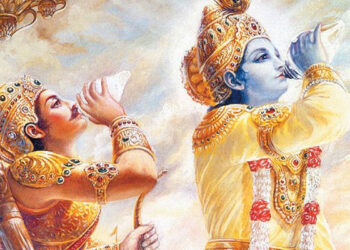TEXT 29
apāne juhvati prāṇaṁ
prāṇe ‘pānaṁ tathāpare
prāṇāpāna-gatī ruddhvā
prāṇāyāma-parāyaṇāḥ
apare niyatāhārāḥ
prāṇān prāṇeṣu juhvati
SYNONYMS
apāne—in the air which acts downward; juhvati—offer; prāṇam—the air which acts outward; prāṇe—in the air going outward; apānam—the air going downward; tathā—as also; apare—others; prāṇa—of the air going outward; apāna—and the air going downward; gatī—the movement; ruddhvā—checking; prāṇa-āyāma—trance induced by stopping all breathing; parāyaṇāḥ—so inclined; apare—others; niyata—having controlled; āhārāḥ—eating; prāṇān—the outgoing air; prāṇeṣu—in the outgoing air; juhvati—sacrifice.
TRANSLATION
Still others, who are inclined to the process of breath restraint to remain in trance, practice by offering the movement of the outgoing breath into the incoming, and the incoming breath into the outgoing, and thus at last remain in trance, stopping all breathing. Others, curtailing the eating process, offer the outgoing breath into itself as a sacrifice.
PURPORT
This system of yoga for controlling the breathing process is called prāṇāyāma, and in the beginning it is practiced in the haṭha-yoga system through different sitting postures. All of these processes are recommended for controlling the senses and for advancement in spiritual realization. This practice involves controlling the airs within the body so as to reverse the directions of their passage. The apāna air goes downward, and the prāṇa air goes up. The prāṇāyāma-yogī practices breathing the opposite way until the currents are neutralized into pūraka, equilibrium. Offering the exhaled breath into the inhaled breath is called recaka. When both air currents are completely stopped, one is said to be in kumbhaka-yoga. By practice of kumbhaka-yoga, one can increase the duration of life for perfection in spiritual realization. The intelligent yogī is interested in attaining perfection in one life, without waiting for the next. Thus by practicing kumbhaka-yoga, the yogis increase their duration of life by many, many years. A Kṛṣṇa conscious person, however, being always situated in the transcendental loving service of the Lord, automatically becomes the controller of the senses. His senses, being always engaged in the service of Kṛṣṇa, have no chance of becoming otherwise engaged. So at the end of life, he is naturally transferred to the transcendental plane of Lord Kṛṣṇa; consequently he makes no attempt to increase his longevity. He is at once raised to the platform of liberation, as stated in Bhagavad-gītā (14.26):
māṁ ca yo ‘vyabhicāreṇa
bhakti-yogena sevate
sa guṇān samatītyaitān
brahma-bhūyāya kalpate
“One who engages in unalloyed devotional service to the Lord transcends the modes of material nature and is immediately elevated to the spiritual platform.” A Kṛṣṇa conscious person begins from the transcendental stage, and he is constantly in that consciousness. Therefore, there is no falling down, and ultimately he enters into the abode of the Lord without delay. The practice of reduced eating is automatically done when one eats only kṛṣṇa-prasādam, or food which is offered first to the Lord. Reducing the eating process is very helpful in the matter of sense control. And without sense control there is no possibility of getting out of the material entanglement.
TEXT 30
sarve ‘py ete yajña-vido
yajña-kṣapita-kalmaṣāḥ
yajña-śiṣṭāmṛta-bhujo
yānti brahma sanātanam
SYNONYMS
sarve—all; api—although apparently different; ete—these; yajña-vidaḥ—conversant with the purpose of performing sacrifices; yajña-kṣapita—being cleansed as the result of such performances; kalmaṣāḥ—of sinful reactions; yajña-śiṣṭa—of the result of such performances of yajña; amṛta-bhujaḥ—those who have tasted such nectar; yānti—do approach; brahma—the supreme; sanātanam—eternal atmosphere.
TRANSLATION
All these performers who know the meaning of sacrifice become cleansed of sinful reactions, and, having tasted the nectar of the results of sacrifices, they advance toward the supreme eternal atmosphere.
PURPORT
From the foregoing explanation of different types of sacrifice (namely sacrifice of one’s possessions, study of the Vedas or philosophical doctrines, and performance of the yoga system), it is found that the common aim of all is to control the senses. Sense gratification is the root cause of material existence; therefore, unless and until one is situated on a platform apart from sense gratification, there is no chance of being elevated to the eternal platform of full knowledge, full bliss and full life. This platform is in the eternal atmosphere, or Brahman atmosphere. All the above-mentioned sacrifices help one to become cleansed of the sinful reactions of material existence. By this advancement in life, not only does one become happy and opulent in this life, but also, at the end, he enters into the eternal kingdom of God, either merging into the impersonal Brahman or associating with the Supreme Personality of Godhead, Kṛṣṇa.



















